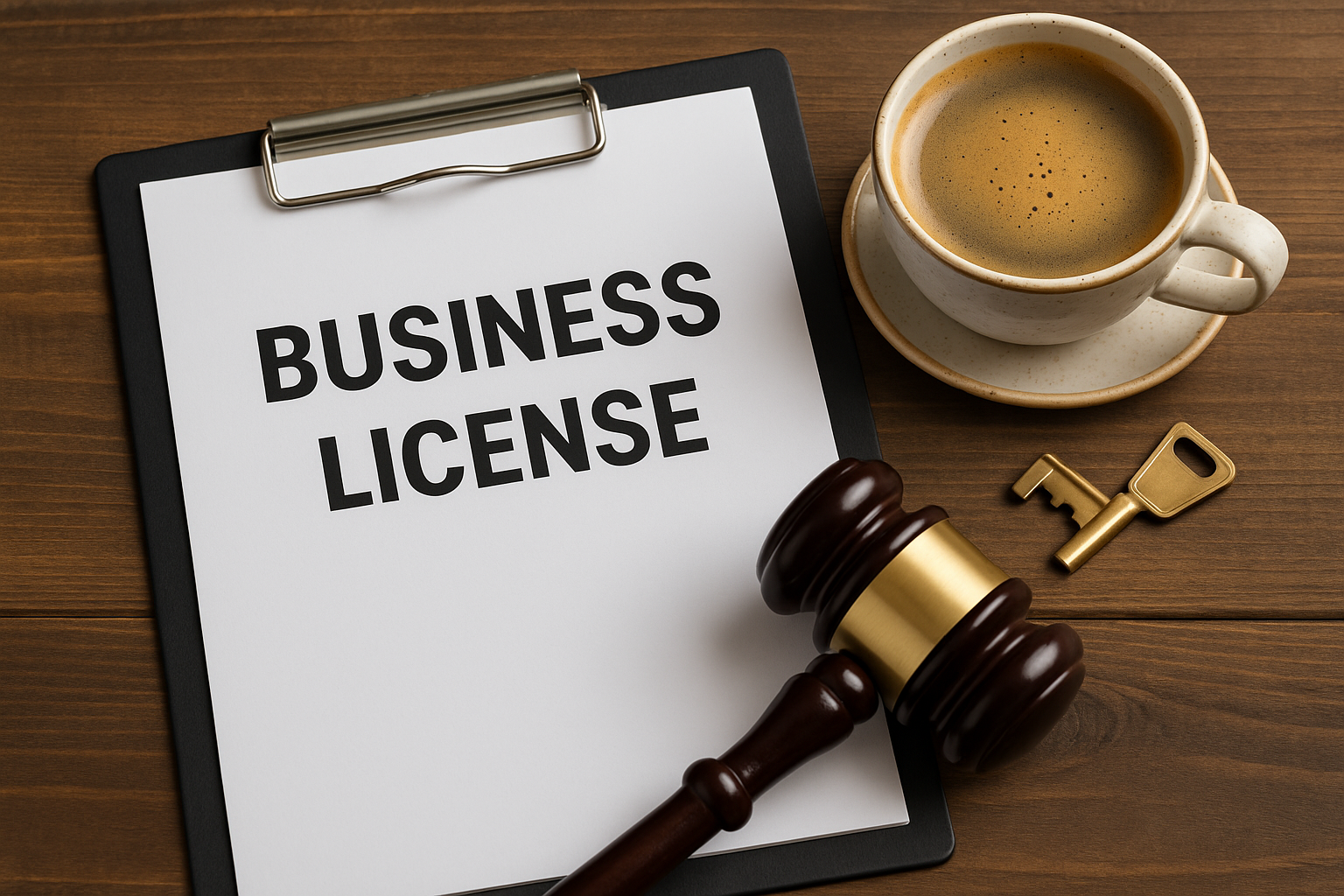You’ve got the passion. You’ve got the beans. You might even have your first few customers lined up. But before you start selling coffee — whether in bags, at events, or through a mobile setup — there’s one big question every aspiring barista entrepreneur needs to ask:
Do I need a business license to sell coffee?
The short answer: yes, most likely.
But don’t worry — it’s not as scary as it sounds. In this article, we’ll break down everything you need to know about licenses, permits, and legal steps so you can get your coffee business up and running the right way — legally and confidently.
Why You Need a License to Sell Coffee
Whether you’re selling espresso at a pop-up, bags of roasted beans online, or cold brew at a market, you’re not just a coffee lover anymore — you’re a business owner. That means certain legal responsibilities come with the territory.
A business license (and related permits) helps to:
- Keep your operation legally compliant
- Protect your business from fines or shutdowns
- Build trust with customers, suppliers, and partners
- Set you up to open business bank accounts, hire help, and pay taxes properly
It’s not about bureaucracy — it’s about building a legit foundation for your brand.
What Type of Coffee Business Are You Starting?
The licenses you need depend on the structure and model of your business.
Here are common coffee business types:
1. Selling Bags of Coffee (Online or In-Person)
You might be:
- White-labeling roasted beans
- Roasting your own coffee at home or commercially
- Selling via e-commerce, Instagram, or markets
2. Operating a Coffee Cart, Truck, or Pop-Up
You might be:
- Serving drinks at events
- Parking a mobile espresso bar in high-traffic areas
- Running a cold brew tap at festivals
3. Freelance Barista Services or Events
You might be:
- Teaching home barista workshops
- Providing private coffee service at offices or weddings
- Consulting cafés or training staff
Each model has different legal and health code implications.
The Core Licenses and Permits You May Need
Let’s break down the most common licenses needed to start selling coffee legally. Keep in mind, the exact names and processes may vary depending on your country, state, or city.
1. Business License or Business Registration
This is your basic operating license. It registers your business with your local government and gives you legal permission to operate.
You’ll usually need to:
- Choose a business name
- Decide on a structure (sole proprietor, LLC, etc.)
- Register with the city or county
- Pay a small fee (anywhere from $30 to $300+ depending on location)
Even if you’re operating from home or online, most cities require this.
2. Food Handler’s Permit / Food Safety Certification
If you’re handling prepared coffee, milk, or food products, you need to demonstrate basic food safety knowledge.
This typically involves:
- Taking an online or in-person training
- Passing a short exam
- Paying a small fee
- Renewing every few years
This license is usually required for each person handling food — including solo operators and staff.
3. Health Department Permit
If you’re preparing or serving coffee (especially espresso drinks, cold brew, or milk-based beverages), your setup must pass a health inspection.
Applies to:
- Coffee trucks and carts
- Pop-ups with espresso machines or cold brew taps
- Any operation preparing drinks, even at temporary events
Health inspectors check for:
- Cleanliness
- Proper storage
- Water and wastewater systems
- Equipment safety
- Food-safe surfaces and temperatures
You’ll likely need a commissary kitchen or approved facility if you’re not operating in a permanent café.
4. Cottage Food License (for Some Home-Based Coffee Sales)
If you roast coffee or bottle cold brew at home, some areas offer cottage food permits — allowing limited, non-commercial food prep in a home kitchen.
Cottage food laws vary widely and often don’t allow beverages, so check carefully. Some locations restrict sales to:
- Farmers markets
- Friends and family
- Local-only delivery
If you’re roasting beans at home for resale, check local guidelines — and consider moving to a licensed roasting space for full legality.
5. Sales Tax Permit
If you’re selling physical goods (like coffee bags or drinks), most places require you to collect and report sales tax.
You’ll need to:
- Apply for a tax ID number
- Collect sales tax at point of sale (online and offline)
- File quarterly or annual reports
- Submit payments to your state or national tax authority
Even if you sell online, you may still be responsible for digital sales tax in some regions.
6. Mobile Vendor or Event Permits
If you plan to serve at:
- Farmers markets
- Food truck parks
- Community events
- Pop-up shops or festivals
You’ll need specific permits for each location. Some are one-day permits, others require annual registration or proof of insurance.
Always check:
- Who’s organizing the event
- If health permits are required on-site
- If you need insurance or fire safety certification
7. Insurance (Not a License, But Still Vital)
Even if not legally required, every coffee business should have:
- Liability insurance — in case someone gets sick or injured
- Property insurance — for gear like espresso machines
- Vehicle insurance — for coffee trucks or carts
- Event insurance — for one-off pop-ups or weddings
This protects your business from unexpected costs — and is often required by event organizers or venues.
What Happens If You Don’t Get Licensed?
Many baristas start selling coffee informally — and while that’s common, it comes with risks:
- Fines or shutdowns if caught
- Ineligibility for bigger events or wholesale
- Lost trust from customers and partners
- Legal issues with taxes or health code violations
Building a brand means thinking long-term. A few hours of paperwork today can save you years of headaches later.
What If I’m Just Starting Small?
Great! You don’t need to go all-in right away. But start setting up the basics:
- Register your business officially
- Get a food handler’s card
- Track income and expenses
- Stay informed about local rules
You can build your brand legally and gradually, one step at a time. The important thing is to start thinking like a business owner, not just a side hustler.
Where to Find Local Licensing Info
Because every country and city has different rules, it’s important to go straight to the source. Start with:
- Your city or county’s business licensing website
- Local health department or food safety agency
- Small Business Administration (SBA) or local small business centers
- Local coffee roasters or food truck groups (they often know the system well)
- Facebook groups or forums for mobile vendors and café owners
If possible, talk to a business attorney or accountant with experience in food businesses.
Bonus Tip: Keep All Your Documents Organized
Create a folder — physical or digital — with:
- Copies of all licenses and permits
- Renewal dates and reminders
- Insurance policies
- Receipts for equipment and setup costs
- Client agreements or event approvals
Staying organized shows you’re professional — and makes life easier when it’s time to renew or expand.
Final Thoughts: Start Smart, Grow Confidently
Starting a coffee business is exciting — but real growth happens when you build on a solid foundation. Getting your licenses and legal ducks in a row may seem overwhelming, but it gives you something more valuable than paperwork:
Peace of mind.
You’ll be able to:
- Join larger events
- Partner with other businesses
- Promote your brand proudly
- Build trust with every cup you serve
So yes — you probably do need a business license to sell coffee.
But more importantly, you need the mindset of someone ready to do this the right way.
Your coffee deserves to be out in the world.
Let’s make sure it gets there — legally, safely, and successfully.

Marcelo Rodrigues is a passionate barista with over 7 years of experience in specialty coffee. He’s worked in top cafés, led barista training sessions, and now shares practical tips to help beginners and coffee lovers improve their skills. Through this blog, Marcel makes the world of coffee more accessible—one cup at a time.

